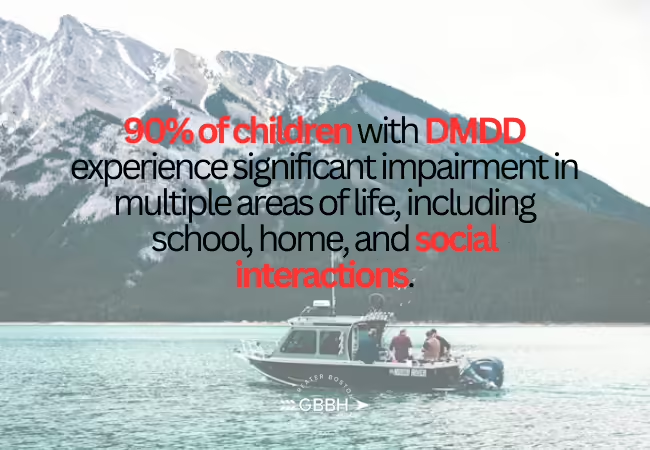Disruptive Mood Dysregulation Disorder (DMDD) is a complex childhood mental health condition characterized by chronic irritability and intense, frequent temper outbursts. These behaviors extend beyond typical childhood tantrums, significantly disrupting a child’s home, school, and social life. DMDD was introduced in the Diagnostic and Statistical Manual of Mental Disorders (DSM-5) in 2013 to address the overdiagnosis of bipolar disorder in children and to provide a framework for treating children with severe emotional dysregulation.
For families in Boston, effective intervention is available through behavioral health in Boston and specialized care programs like anger management programs, Intensive Outpatient Programs (IOPs), and Partial Hospitalization Programs (PHPs). This guide provides an in-depth understanding of DMDD, its symptoms, underlying causes, and a range of treatment options to help children manage their emotions and behaviors.
What is Disruptive Mood Dysregulation Disorder (DMDD)?
DMDD is a mood disorder that affects children and adolescents aged 6–18 years, marked by chronic irritability and recurrent temper outbursts. It differs from other mood and behavioral disorders, such as bipolar disorder or oppositional defiant disorder (ODD), by its pervasive and persistent nature. Children with DMDD are often perceived as “difficult,” but their behaviors stem from genuine emotional dysregulation that requires professional support.
Symptoms of DMDD
DMDD symptoms are divided into two primary areas: chronic irritability and severe, recurrent temper outbursts. These symptoms must persist for at least 12 months and occur in multiple settings (e.g., home, school, social environments).
1. Chronic Irritability
- Persistent anger, frustration, or annoyance that lasts most of the day, nearly every day.
- Ongoing mood instability that is evident to caregivers, teachers, and peers.
- Difficulty calming down after minor frustrations, leading to prolonged emotional distress.
2. Severe Temper Outbursts
- Verbal or physical aggression directed at others, property, or oneself.
- Episodes that are grossly disproportionate to the triggering event.
- Occur three or more times per week and are inconsistent with the child’s developmental level.
3. Functional Impairment
- Academic Challenges: Difficulty concentrating and completing tasks due to frequent emotional outbursts.
- Social Struggles: Trouble forming and maintaining friendships because of unpredictable behavior.
- Family Conflict: High levels of tension at home due to the child’s chronic irritability and explosive temper.
4. Co-Occurring Symptoms
- Anxiety, depression, and emotional withdrawal are commonly observed in children with DMDD.
- Many also exhibit symptoms of ADHD, oppositional defiant disorder (ODD), or autism spectrum disorder (ASD), complicating diagnosis and treatment.
Causes and Risk Factors of DMDD
The exact cause of DMDD is not fully understood, but research suggests a combination of biological, genetic, and environmental factors:
1. Neurological Differences
- Brain Development: DMDD is associated with structural and functional differences in the amygdala and prefrontal cortex, areas of the brain responsible for regulating emotions and decision-making.
- Neurotransmitter Imbalance: Low levels of serotonin, a chemical that regulates mood, may contribute to chronic irritability.
2. Genetic Factors
- A family history of mood disorders, such as depression, anxiety, or bipolar disorder, increases the likelihood of developing DMDD.
3. Environmental Influences
- Exposure to chronic stress, trauma, or inconsistent discipline in childhood can exacerbate emotional dysregulation.
- Children in unstable home environments or those experiencing bullying at school may display heightened symptoms.
4. Co-Occurring Conditions
- DMDD frequently coexists with other mental health conditions, such as:
- ADHD: Difficulty focusing and impulsivity can worsen emotional outbursts.
- Anxiety Disorders: Persistent worry may intensify irritability and frustration.
- Depression: Feelings of hopelessness may manifest as anger or aggression.
How DMDD Differs from Similar Disorders
DMDD can overlap with symptoms of other disorders, making accurate diagnosis critical. Below are key distinctions:
| Condition | Primary Characteristics |
|---|---|
| DMDD | Chronic irritability and frequent temper outbursts; emotional dysregulation is pervasive across settings. |
| Bipolar Disorder | Cyclical episodes of mania and depression; mood changes are episodic rather than chronic. |
| Oppositional Defiant Disorder (ODD) | Defiant, non-compliant behavior directed at authority figures; emotional dysregulation is less severe. |
| Autism Spectrum Disorder (ASD) | Social communication challenges and repetitive behaviors; emotional dysregulation may occur in response to sensory overload. |
Treatment Options for DMDD
DMDD requires a multifaceted treatment plan that addresses both the child’s emotional dysregulation and underlying triggers. Effective interventions include therapy, medication, structured programs, and school-based support.
1. Psychotherapy
- Cognitive-Behavioral Therapy (CBT):
Teaches children to identify triggers, challenge negative thought patterns, and develop healthier coping strategies. - Dialectical Behavior Therapy (DBT):
A modified form of DBT for children focuses on emotional regulation, distress tolerance, and interpersonal effectiveness. - Family Therapy:
Helps parents and caregivers implement consistent discipline strategies, improve communication, and create a supportive home environment. - Anger Management Programs:
Target emotional dysregulation and teach children how to respond to frustration in healthier ways. These are particularly beneficial for anger management in recovery efforts.
2. Medication
While therapy is the cornerstone of DMDD treatment, medication may be used to manage severe symptoms or co-occurring conditions:
- Antidepressants (SSRIs): To address chronic irritability and underlying depression or anxiety.
- Stimulants: For children with co-occurring ADHD to improve focus and reduce impulsivity.
- Mood Stabilizers: For children with severe emotional volatility to regulate mood.
3. Structured Mental Health Programs
Structured care provides intensive support for children with severe symptoms:
- Intensive Outpatient Programs (IOPs):
Offer therapy several times a week, focusing on skill-building, emotional regulation, and coping strategies. - Partial Hospitalization Programs (PHPs):
Provide daily therapeutic support and psychiatric care for children who require more intensive intervention but do not need inpatient hospitalization.
4. School-Based Support
- Collaborating with teachers and school counselors to create Individualized Education Plans (IEPs) or 504 Plans tailored to the child’s needs.
- Implementing strategies like frequent breaks, clear behavioral expectations, and positive reinforcement.
Why Seek Help for DMDD?
1. Prevent Long-Term Consequences
- Without treatment, DMDD can lead to academic underachievement, social isolation, and increased risk of developing anxiety, depression, or substance use disorders later in life.
2. Improve Family Dynamics
- DMDD often creates high levels of family stress. Professional guidance helps caregivers develop effective parenting strategies and reduce conflict at home.
3. Build Emotional Regulation Skills
- With appropriate therapy, children can learn to manage their emotions, build stronger relationships, and improve their overall quality of life.
4. Address Co-Occurring Conditions
- Treating underlying conditions like anxiety, ADHD, or depression is critical for long-term success.
Final Thoughts
Disruptive Mood Dysregulation Disorder is a challenging condition that affects not only the child but also their family, school, and social relationships. However, with the right combination of therapy, medication, and structured support, children with DMDD can learn to regulate their emotions, develop healthy coping mechanisms, and thrive in their daily lives.
At Greater Boston Behavioral Health, we are dedicated to helping families navigate DMDD with personalized, compassionate care. Whether through an anger management program, an anxiety treatment program, or structured support like IOPs and PHPs, our team is here to guide you every step of the way.
Contact us today at (888)278-0716 to learn more about our programs and take the first step toward a brighter future for your child.
FAQs on
What is Disruptive Mood Dysregulation Disorder (DMDD)?
DMDD is a childhood mental health condition characterized by chronic irritability and frequent, severe temper outbursts. It affects children aged 6–18 and significantly impacts their ability to regulate emotions and maintain relationships.
How is DMDD different from bipolar disorder?
Unlike bipolar disorder, DMDD does not involve episodic mood swings between mania and depression. Instead, it is marked by persistent irritability and frequent outbursts across various settings.
What are the main symptoms of DMDD?
Key symptoms include:
- Chronic irritability and anger.
- Severe temper outbursts that occur at least three times a week.
- Significant impairment in home, school, and social settings.
What causes DMDD?
DMDD is caused by a combination of factors, including:
- Differences in brain regions responsible for emotion regulation.
- Genetic predisposition to mood disorders.
- Environmental factors like chronic stress or trauma.
How is DMDD diagnosed?
DMDD is diagnosed through a comprehensive evaluation by a mental health professional, which includes reviewing the child’s behavioral history and ruling out other conditions like ADHD, autism, or bipolar disorder.
What treatments are available for DMDD?
Effective treatments include:
- Therapy: Cognitive-Behavioral Therapy (CBT), Dialectical Behavior Therapy (DBT), and family therapy.
- Anger Management Programs: Help children learn to manage frustration constructively.
- Medication: Antidepressants, stimulants, or mood stabilizers may be prescribed.
- Structured Programs: Intensive Outpatient Programs (IOPs) or Partial Hospitalization Programs (PHPs).


